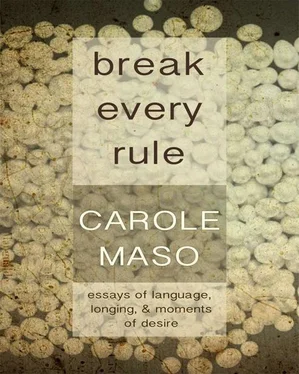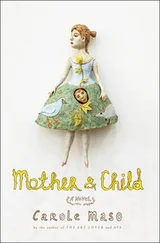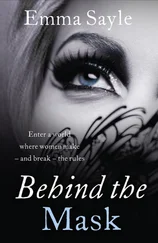The remote hand holds the vestiges of the might-have-been — but forgetful, indifferent, or finally just too tired — you let go of it — that last recognizable part of you — you let it go. And you forget finally completely.
And she steps into numbness without much of a fight, without much of a fight after all. Estrangement and distance become her, don’t you think?
Can’t remember much anymore.
How to describe that white world where from time to time she might make small trips out into a terrible, animated rage, doing awful things, and then fall back into speechlessness, a sorrow so pervasive— Is anyone there? Is anyone in there? Doctors are saying, lovers are saying, friends are saying. Helen. Increasingly difficult. Is anyone in there? Increasingly difficult to know.
Once she did, she dreamed in brilliant green…Wildness of the child. Audacity of the child. That passionate, vibrant place.
Look we already know the artist is despised — and it’s not too harsh a word , despised. Really? You think you are a writer? Even if you were it would be treated with dismissal — (and you’re no writer because, let’s face it, a writer writes, does she not?)
Of course the real contempt is reserved for the real writer, the real artist. She hears the scoffing of the bourgeoisie, the trivializing, the diminishing, the belittling of all that mattered most to her, whenever she’d come out for a little foray into the 1980s.
It is well past time to mention her father in all of this. The only one who purely encouraged back then. He was the only one as she moved toward adulthood who never asked of her or expected of her the typical, the conventional. Exerted no pressure. No will over her. The least patriarchal patriarch in the world. She should become an artist. Whatever that would mean. He had been a trumpet player, an artist — and he had felt, though he never said it of course, every day the gravity of disobeying that thing. He had been a musician — but now deprived of a sustainable art form (for how could a trumpet player with five children survive?). He had withdrawn from the world. The price had been high. He lived in ice. She felt she was going there to join him.
Daddy.
Once the original, wild, insistent self is lost — how difficult it is to retrieve.
They lie in the amorphous dark and listen to music.
Somewhere she must have, certainly she must have still longed for that thing — wanting to hear as she once did — perfectly through water.
The parts that got lost.
She felt she was expected to follow the normative, asked, over time, since high school really, to put away the world’s strangeness, its silences, its dark, its mystery and melancholy and fall into mindless, cheerful line — until the intensity of the strangeness — fear and awe, wonder and sorrow and everything you felt in silence, in the depth of your being, the power, the oddness, the truest, most important, original part of you — the part you could least afford to lose — was lost, socialized, little by little, almost entirely away.
She was asked to conform in absolutely every aspect of her life. Even when it did not appear so. Even in one’s artistic choices — the place of so-called freedom.
Male editors at major houses are saying — female editors, who have embraced entirely the whole nine yards are saying:
Exactly what one should write. If you want to get published at any rate. And exactly how. So that even one’s creative life was prescribed. In order to be published you must…orders coming down as if from on high. Place a character in a conflict and then resolve. Get the reader’s attention through blah, blah, blah… Engraved on a kind of tablet. Serious fiction is. Serious fiction must. If you want to be reviewed. If you want to be taken seriously. If you want to publish with us. The promise of publication keeping everyone in some useless line. Everyone is gray and sounds the same.
Even the book is a box.
Do not take even this. Even this away. The one hopeful place. Even the book.
How to imagine shedding convention then? As insidious as it was, as ingrained. As ubiquitous as its message. Coming from every direction at once. What a novel is — what a family is — what a life is — what a woman’s life must be — where was this voice coming from — it seemed it came from everywhere and nowhere at the same time. An admonishing figure.
All the diminishment. Her pale white universe. Slipping into a white shift, against white skin, and the hair prematurely turning white— don’t go , someone whispers, but she can’t do anything else really…
The thousand inappropriate ways one tried to get free back then.
The thousand less-than-perfect, oh yes, less-than-effective ways to try to wriggle free — or if not that — at least to forget a while.
I went to therapy finally as the result of an ultimatum. Helen said go or I will leave you . She said someone could help you . She said. And I could not fathom the idea of the world without her. She said. And because I loved her I said yes . Though she did not understand. Though I did not believe there was help for me. Though the very idea of therapy made me cringe— all that talking —I loved her. She said we can’t live like this anymore .
She said, severely depressed, disoriented, out of control, she said. Suicidal. No, not that. It would have taken far more engagement I believed to have pulled off such a feat. Far more moral courage. Still it could happen perhaps — one liaison, one toxic narcotic cocktail away. I protested when she began the litany against me, but still I understood it as such: I was suffering, had been suffering a long time — in this time before real writing — when I was lost. A debilitating depression, a world hermetically sealed off — punctuated by episodes of high mania: sleeplessness, delusions, rage.
A string of sexual encounters. Did it not suggest I was still alive?
Get help .
Through the estrangement, through the isolation I could hear her — but muffled.
She said or I will leave
And that I had to go further and further, look for more and more elaborate, lavish, excessive, intense experience, more dangerous, more thrilling to prove— to prove what?
How had I gotten that way — that dangerously happy little girl, hour after hour, year after year, engrossed in her make-believe world? In love with the solitary place of her imagination.
She said. When the world was white and sorrow fell like snow, and nothing, nothing seemed familiar anymore.
And I said yes. Because my life had become utterly unrecognizable, not only to those who felt they knew or loved me, but also to me.
And on a day where the whiteness lifted, if only slightly, stumbling through drifts and drifts of oblivion in my pale shift, I went.
With real misgiving, trepidation dread even, a deep wariness. On an animated day I might have said how I detested psycho-babble, how skeptical I was of the whole endeavor. How suspect I found much of Freud — all the nonsense on women, on dreams. How hopeless, how useless. How much more clever I believed myself to be than anyone I could possibly find to work with. I went because I was forced to.
To the woman’s office in her apartment on the Upper West Side. I sat glumly across from her. I don’t know what to say .
Where to even imagine beginning? All that would be reduced or left out. Or overemphasized because language could best speak to certain things, but not others. The belief that words have stable meaning and can in ordinary speech convey what one is feeling struck me as naive and really quite quaint. And wasn’t that how therapy was supposed to work? I was and am deeply suspicious of language, as I think any serious writer must be. My reverence for silence, and for what cannot ever be known or understood, made this therapy business a very dicey proposition indeed. The tendency to impose false shapes, the simplistic desire for the assignment of cause, one’s hunger for why, one’s need for motivation, then solution. The preconceptions, the generalizations, the summing up — all worrisome, worrisome. And the language — oh God— dyfunctional this and that, empowerment issues, abandonment issues —how awful. The one absolutely intolerable thing. The debasement of the language. I braced myself for the absolute worst.
Читать дальше












